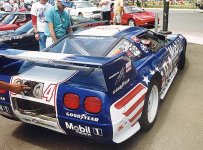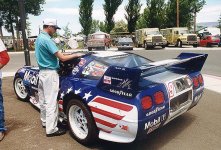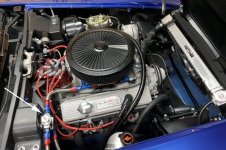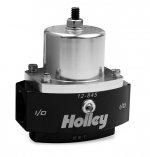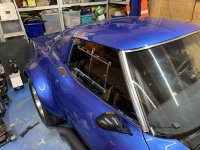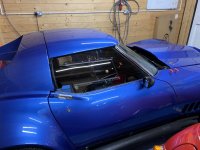You are using an out of date browser. It may not display this or other websites correctly.
You should upgrade or use an alternative browser.
You should upgrade or use an alternative browser.
C3 Race Car Build
- Thread starter Oneball
- Start date
Oneball
CCCUK Member
Oneball
Is that a fuel pressure regulator I point to and is it mechanical or require engine vacuum, as I see no hose to it ?
View attachment 14909
Yes fuel pressure regulator, no need for a vacuum pipe as the relief pressure doesn’t change its purely there to ensure the feed doesn’t blow past the needle in the float chamber. It’s basically a spring with a diaphragm and a return line to the tank.
sublimemike
Well-known user
Are you running an in line fuel pressure gauge? Reason I ask is on the bottom of my older version of the regulator I have is where the line to my pressure gauge hooks up? Return line is something I've had in mind for a while - saves stressing the pump.
Oneball
CCCUK Member
Are you running an in line fuel pressure gauge? Reason I ask is on the bottom of my older version of the regulator I have is where the line to my pressure gauge hooks up? Return line is something I've had in mind for a while - saves stressing the pump.
No haven’t got a gauge, I don’t like them. If they’re in the engine bay their pointless. If they’re in the cockpit they’re a fire source unless you have an isolator or electric gauge.
Oneball
CCCUK Member
We love noise,
lots of it, must mean making a ton of torque and HP
Are you using a 650 or 750 double pumper ?
750 double pumper. Just trying to sort the little niggles then will get it on a dyno and find out.
teamzr1
Supporting vendor
Those were the easy years going to the track as I would store a small tool box that had different sized Holly jets, springs and weights for the Dist and a timing light and adjust at the track
Today's Corvettes, different animal and mind set in tuning the controllers to adjust for elevation, temps, etc
Today's Corvettes, different animal and mind set in tuning the controllers to adjust for elevation, temps, etc
James Vette
CCCUK Member
Roscobbc
Moderator
Most people significantly overdo replacement fuel pumps (certainly for street use) and all too easy to do with an electric pump. It almost seems counter productive to use a high pressure, high volume fuel pump and then have to reduce the pressure due to the inability of the float needles to handle the pressure. In most cases stock mechanical fuel pumps are more than adequate. For several years I used a stock spec' mech pump (so no regulator required) to feed a 950 double pumper on my close to 600 hp big block. Only upgraded to a high volume (not high pressure) mech pump when, finally years of modern petrol use caused the pump diaphragm to degrade. You can buy a fuel log c/w built-in pressure gauge - its a useful check point for a working fuel pump when working under the hood.
teamzr1
Supporting vendor
@teamzr1 Too much technology too many complications.
James
My C3 Corvettes were lucky to get 10 MPG and that was with less than 200 flywheel HP
It was those bad smog years that sparked the technology age and has been growing since the 1984 came out
Each year it got more complex but still due to smog and fuel mileage laws caused the electronics to take over and make performance gains
My 1999 C5 stock was like 350 flywheel HP ( about 15% loss over drivetrain)
I have a garage full of hand tools over the last 55 year but most of them are useless today
With the work I did to the '99 an example of what is done by wrenching would not have been much of a success without
knowing the electronics age.
Look at the load bearing chassis dyno results after my work which was greatly affected by knowledge of today's vehicles and that
is making the mods work together by tuning the controllers
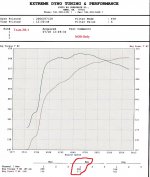
So that is at rear wheels my 99 C5 runs up to 600 HP/Tq and that is at the rear wheels
And even with a 3.73 rear end gear, I can get 30 MPG on highway if I drive it normal
That's the problem, this has been around since mid 1980s, but people are not bothering how this all works and adapt to it
C3 days people had to play around with carb jet sizes, today AFR changes are done in a couple of minutes of tuning the engine controller
so it commands the fuel injector less or more dependent on what I see by using a OBD-II scanner and the data that PCM controller reports
Wrenching cannot fix changes, esp when getting complex
Example is I can tune almost any GM vehicle that uses a gas engine such as a guy in the Middle East put a supercharger on a C6 Corvette
and in that high heat.
Vette of course ran like total crap and close to blowing the engine to hell
He contacted me and within 2 hours I was able to cook up a custom tune and I tuned him via emails !
And the C6 ran great with the tune
So complex can be good, it just means people have to learn about this or go to people like me that understand the bits and bytes
I have taught all about this at a local college and these students worked in the vehicle repair business and most of them did not
know what I was talking about and when asked how they fixed customers' vehicle problems, the common answer was they threw parts at
it until the problem went away but if the used today's tools the scanner would have told them what the problem was in like 10 minutes

Oneball
CCCUK Member
Most people significantly overdo replacement fuel pumps (certainly for street use) and all too easy to do with an electric pump. It almost seems counter productive to use a high pressure, high volume fuel pump and then have to reduce the pressure due to the inability of the float needles to handle the pressure. In most cases stock mechanical fuel pumps are more than adequate. For several years I used a stock spec' mech pump (so no regulator required) to feed a 950 double pumper on my close to 600 hp big block. Only upgraded to a high volume (not high pressure) mech pump when, finally years of modern petrol use caused the pump diaphragm to degrade. You can buy a fuel log c/w built-in pressure gauge - its a useful check point for a working fuel pump when working under the hood.
I’ve not used a high pressure pump. It’s low pressure, high flow. The high flow rate is required for a race car. A pressure regulator is usually needed as different carbs require different pressures from 1.5-8psi. The variation isn’t needed on most aftermarket mech pumps as they’re usually designed with a particular carb in mind, as are some electrical fuel pumps. A mech pump will do the same job as an electric one it’s just not an instant feed.
Roscobbc
Moderator
And there lies the potential issue (and confusion for some) in the difference between a high pressure and high volume fuel pump (or oil pump for that matter) - agree that a race car generally being driven continuously at full bore needs a constant fuel supply to the carb which also needs to deal with effects of pumping fuel whilst cornering, accelerating hard etc...........much the same for drag racing dealing with extreme G's...........but for street vehicles.......?I’ve not used a high pressure pump. It’s low pressure, high flow. The high flow rate is required for a race car. A pressure regulator is usually needed as different carbs require different pressures from 1.5-8psi. The variation isn’t needed on most aftermarket mech pumps as they’re usually designed with a particular carb in mind, as are some electrical fuel pumps. A mech pump will do the same job as an electric one it’s just not an instant feed.
Oneball
CCCUK Member
And there lies the potential issue (and confusion for some) in the difference between a high pressure and high volume fuel pump (or oil pump for that matter) - agree that a race car generally being driven continuously at full bore needs a constant fuel supply to the carb which also needs to deal with effects of pumping fuel whilst cornering, accelerating hard etc...........much the same for drag racing dealing with extreme G's...........but for street vehicles.......?
Street car I’d go for a mechanical one. Super simple, no additional wiring etc etc
teamzr1
Supporting vendor
No haven’t got a gauge, I don’t like them. If they’re in the engine bay their pointless. If they’re in the cockpit they’re a fire source unless you have an isolator or electric gauge.
Here in the USA they do not allow fuel pressure gauge that has a fuel line into the cabin area
Has to be electronic and they cost more
I bought one from a vendor that is supposed to be a pro in gauges and to be of quality
Starting with the C5s the fuel rail pressure is 58 PSI
After installing this gauge via a A pillar 2 pod, it was in the winter time very cold weather and testing of the gauge showed correct PSI
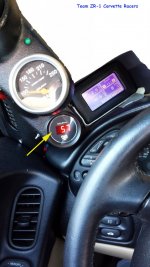
Then next summer I started noticing the gauge reporting the rail pressure would go lower
I then assume it was the main fuel pump (C5 and newer has to gas tanks, so there are 2 pumps)
PSI was dropping to low so like a dummy I put the main pump and began changing it and what a fricking bitch it was to replace
it as it all one piece with pump, float, etc. and sits right be left rear suspension
Did a lot of swearing but finally got new unit in
Went and testdrove it and WTF, the reported pressure was still dropping
So I began to thermal map the engine bay and after some testing found that the damn fuel gauge sensor that mounts to the fuel rail
was crappy as the hotter it got, the lower it reported the rail PSI
Contacted the maker of this, and they claimed they never heard of such a problem (BS)
they sent me another sender and sure as sh*t it also was flaky as the sender outputs a resistance value that sends the analog value to
the gauge which converts that to a PSI value
I on purpose moved their sender way over to firewall in left corner where it is cooler and thermal wrapped that and sure enough the reported rail pressure never dropped more than 1 PSI
In the end I did major in-depth testing covering 2 years and all the info and end results here
designTest results
Oneball
CCCUK Member
Its gonna get warm in that cabin.............how do race regs affect T Top useage? do they have to be permanently fixed (or at least have a more secure fixing methos than stock) - one of these flying off during a race could be nasty
They need to be on for most things. More around being a GT than safety. They’ve got the standard fixing which I’ll probably lock wire.
Still got foot well vents and a blower feed from outside as well as the AstroVent. But race cars always get hot. You never really notice till you get out!
teamzr1
Supporting vendor
All brackets made up to mount the plexi window to the inner door skin and bolted in on the passenger side with a bit of swearing! Good bit lighter than the standard glass and all the mechanism is gone too.
On subject of your using plexiglass
When I was on my quest to run speeds over 200 MPH I put my C4 ZR-1 on a heavy diet
That included getting rid of the heavy weight of the rear hatch glass
I had another made using Lexan which reduced weight by 60 %
First race I did going over like 170 MPH even with a full faced helmet all of a sudden I felt this cooler air stream coming at me from behind
Looked in the drivers outside mirror to see the hatch looked like a bird with flapping wings !
Oh, Sh . .
I had to do two things, run metal strips from roof back you can see below and a metal strip around where bottom of hatch was
to prevent it blowing outwards
Also had to drill the gas pressurized hatch struts to rid the pressure as they were pushing that lighter hatch upwards
